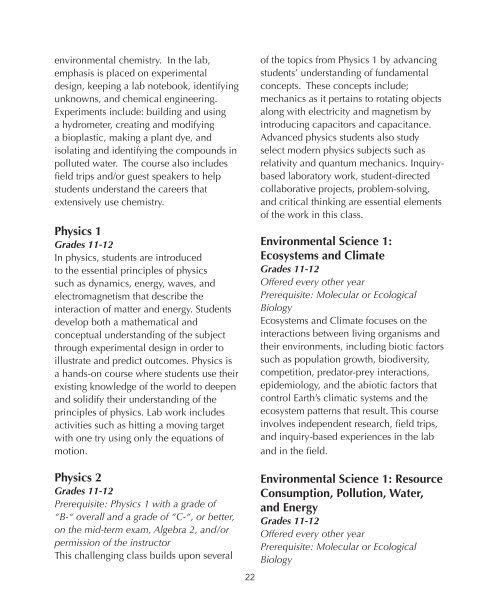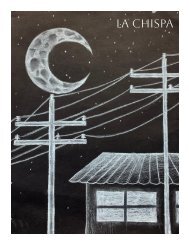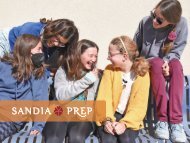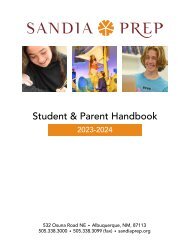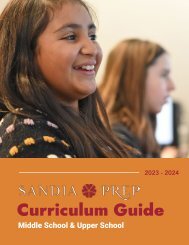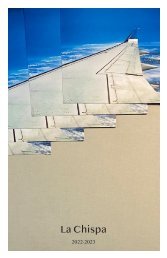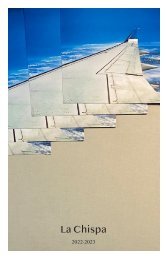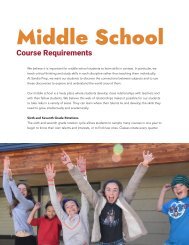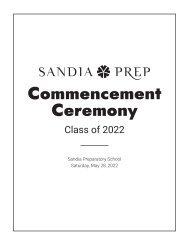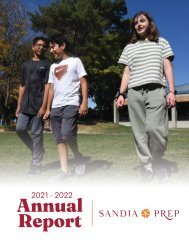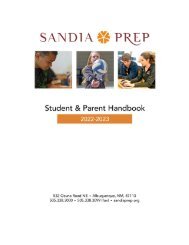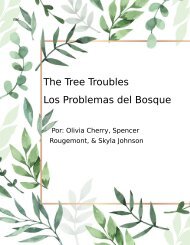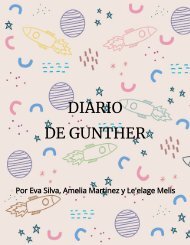Sandia Prep Curriculum Guide 2018 - 2019
Middle School and Upper School curriculum guide for the 2018 - 2019 school year
Middle School and Upper School curriculum guide for the 2018 - 2019 school year
Create successful ePaper yourself
Turn your PDF publications into a flip-book with our unique Google optimized e-Paper software.
environmental chemistry. In the lab,<br />
emphasis is placed on experimental<br />
design, keeping a lab notebook, identifying<br />
unknowns, and chemical engineering.<br />
Experiments include: building and using<br />
a hydrometer, creating and modifying<br />
a bioplastic, making a plant dye, and<br />
isolating and identifying the compounds in<br />
polluted water. The course also includes<br />
field trips and/or guest speakers to help<br />
students understand the careers that<br />
extensively use chemistry.<br />
Physics 1<br />
Grades 11-12<br />
In physics, students are introduced<br />
to the essential principles of physics<br />
such as dynamics, energy, waves, and<br />
electromagnetism that describe the<br />
interaction of matter and energy. Students<br />
develop both a mathematical and<br />
conceptual understanding of the subject<br />
through experimental design in order to<br />
illustrate and predict outcomes. Physics is<br />
a hands-on course where students use their<br />
existing knowledge of the world to deepen<br />
and solidify their understanding of the<br />
principles of physics. Lab work includes<br />
activities such as hitting a moving target<br />
with one try using only the equations of<br />
motion.<br />
Physics 2<br />
Grades 11-12<br />
Prerequisite: Physics 1 with a grade of<br />
“B-“ overall and a grade of “C-“, or better,<br />
on the mid-term exam, Algebra 2, and/or<br />
permission of the instructor<br />
This challenging class builds upon several<br />
22<br />
of the topics from Physics 1 by advancing<br />
students’ understanding of fundamental<br />
concepts. These concepts include;<br />
mechanics as it pertains to rotating objects<br />
along with electricity and magnetism by<br />
introducing capacitors and capacitance.<br />
Advanced physics students also study<br />
select modern physics subjects such as<br />
relativity and quantum mechanics. Inquirybased<br />
laboratory work, student-directed<br />
collaborative projects, problem-solving,<br />
and critical thinking are essential elements<br />
of the work in this class.<br />
Environmental Science 1:<br />
Ecosystems and Climate<br />
Grades 11-12<br />
Offered every other year<br />
Prerequisite: Molecular or Ecological<br />
Biology<br />
Ecosystems and Climate focuses on the<br />
interactions between living organisms and<br />
their environments, including biotic factors<br />
such as population growth, biodiversity,<br />
competition, predator-prey interactions,<br />
epidemiology, and the abiotic factors that<br />
control Earth’s climatic systems and the<br />
ecosystem patterns that result. This course<br />
involves independent research, field trips,<br />
and inquiry-based experiences in the lab<br />
and in the field.<br />
Environmental Science 1: Resource<br />
Consumption, Pollution, Water,<br />
and Energy<br />
Grades 11-12<br />
Offered every other year<br />
Prerequisite: Molecular or Ecological<br />
Biology


